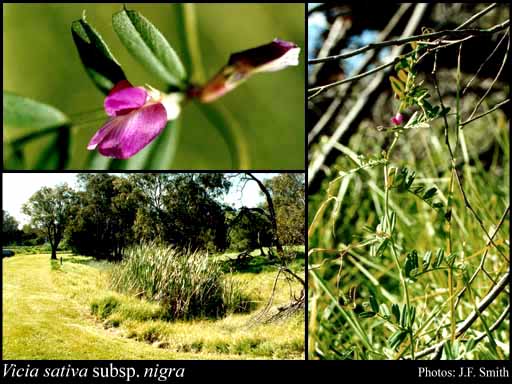- Reference
- Hannover.Mag. 15):229 (1780)
- Conservation Code
- Not threatened
- Naturalised Status
- Alien to Western Australia
- Name Status
- Current
Prostrate, twining or scrambling annual, herb, 0.2-1.1(-3) m high. Fl. blue-purple-pink/white, Jul to Dec. Grey, yellow or brown sand, black sandy clay, limestone, quartzite. Swampy damp areas, breakaways, valleys, road verges, croplands, wastelands.

Scientific Description
Twining or climbing plants. Stems terete, not spiny, glabrous; pustules or glands absent. Leaves or phylloclades clearly present, compound, alternate, continuous with stem, 45-100 mm long, glabrous, flat with flat margins; margins entire; tubercles absent, leaflets 8-16, pinnately arranged, terminal leaflet absent, stalked; pustules or glands absent. Stipules present and persistent to older leaves, 3-8 mm long, without glands, ribless. Pedicel present, 2-4 mm long, hairy. Bracteoles absent. Calyx 10-11 mm long, not accrescent, hairy, with simple hairs, ribless; pustules or glands absent. Corolla 17.5-21 mm long, multicoloured, mostly pink, purple, white or blue, with some pink, purple, white or blue spots, streaks or blotches; claws present; standard 16.5-18 mm long, glabrous, not auriculate, wings 15-17 mm long, not auriculate, keel 10.5-12 mm long, not beaked, not auriculate. Stamens ten, at two different levels (filaments alternately long and short); filaments united in an open sheath with one free stamen, 10-10.3 mm long. Ovary stipitate, hairy or glandular; style 11.5-12 mm long, hairy or glandular towards the base, bearded (with a tuft of hairs at apex), terete. Fruit dehiscent (a pod or follicle), 40-55 mm long, 5-7 mm wide, stipitate or sessile or subsessile, not constricted between the seeds, flat or compressed, glabrous, not beaked. Flowers in August, September, October and November. Occurs in the Eremaean and South-West Botanical Province, in the Nullarbor, Avon Wheatbelt, Jarrah Forest, Warren, Esperance and Swan Coastal Plain IBRA regions.
Distribution
- IBRA Regions
- Avon Wheatbelt, Esperance Plains, Jarrah Forest, Nullarbor, Swan Coastal Plain, Warren.
- IBRA Subregions
- Fitzgerald, Katanning, Northern Jarrah Forest, Nullarbor Plain, Perth, Recherche, Southern Jarrah Forest, Warren.
- IMCRA Regions
- Central West Coast, Leeuwin-Naturaliste, WA South Coast.
- Local Government Areas (LGAs)
- Albany, Augusta Margaret River, Bayswater, Bunbury, Busselton, Cambridge, Canning, Capel, Cockburn, Cranbrook, Denmark, Esperance, Joondalup, Kalamunda, Kalgoorlie-Boulder, Manjimup, Melville, Murray, Nannup, Nedlands, Perth, Plantagenet, Quairading, Stirling, Subiaco, Wagin, Wanneroo.